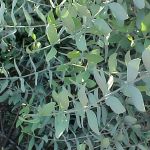| Common Name: |
Jojoba |
| Other Names: |
Goat Nut |
| Botanical Name: |
Simmonsia chinensis syn. S. californica |
| Genus: |
Simmondsia |
| Family: |
Simmondsiaceae |
| Native Location: |
Native to the Sonoran Desert (southwestern USA, NW Mexico). |
| Cultivation: |
Deep, well-drained to dry, sandy or gravelly, slightly acid soil in full sun. Tolerates drought. |
| Propagation: |
By seed sown in spring; by nodal cuttings in spring; by heel cuttings in autumn. |
| Harvest: |
Seeds are collected when ripe and crushed to extract oil. |
| Height: |
2m (6ft) |
| Width: |
1-2m (3-6ft) |
| Hardiness: |
Z9-10 |
| Parts Used: |
Oil (from seeds) |
| Properties: |
An odorless, soothing herb with exceptional skin-softening effects. |
| Medicinal Uses: |
Externally for dry skin and hair, psoriasis, acne, and sunburn. |
| Economic Uses: |
Oil is added to shampoos, conditioners, moisturizers, soaps, massage oils, sunscreens, pharmaceutical creams; in coatings for candy, food, and tablets. Jojoba oil has numerous industrial applications as a lubricant, surfuctant, stabilizer, emulsifier, and solubilizer. |
| Bibliography: |
Encyclopedia of Herbs by Deni Brown Copyright © 1995, 2001 Dorling Kindersley Limited Pg 369 |

